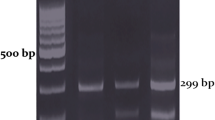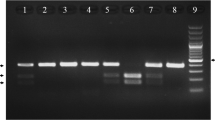Abstract
This study was to evaluate the association between ADIPOQ gene variants and type 2 diabetes mellitus (T2DM). TaqMan® assay was performed to test the genotypes in T2DM patients (n = 1,105) and normal control subjects (n = 1,107). Serum adiponectin concentration was measured by ELISA kit. The variant genotypes rs7649121AT and rs7649121AT/TT, compared with the AA genotype, were associated with a significantly decreased risk of T2DM [Adjusted OR (95% CI) = 0.79(0.66–0.95), 0.80(0.67–0.96), respectively]. In stratified analysis, rs2241767AG genotype increased the risk of T2DM in obesity group [Adjusted OR (95% CI) = 1.32(1.03–1.69)]. Patients with genotype AG/GG of rs2241767 had lower levels of serum adiponectin than those with the genotype AA (P = 0.044). Haplotype analyses were not significant. Crossover analysis of rs7649121 and environmental risk factor (obesity) indicated that the protect effect of rs7649121AT/TT maybe offset by the environmental risk. Those who exposed to environmental risk factor (obesity) had a chance to attack T2DM compared with those who did not expose to the two factors [Adjusted OR (95% CI) = 1.64(1.30–2.06)]. This study suggested that the ADIPOQ gene polymorphisms were associated with the risk of T2DM in a Chinese Han population.

Similar content being viewed by others
References
M. Stumvoll, B.J. Goldstein, T.W. Haeften, Type 2 diabetes: principles of pathogenesis and therapy. Lancet 365(9467), 1333–13461 (2005)
K. Das, Y. Lin, E. Widen, Y. Zhang, P.E. Scherer, Chromosomal localization, expression pattern and promoter analysis of the mouse gene encoding adipocyte-specific secretory protein Acrp30. Biochem. Biophys. Res. Commun. 280(4), 1120–1129 (2001)
M.F. Hivert, A.K. Manning, J.B. McAteer, J.C. Florez, J. Dupuis, C.S. Fox, C.J. O’Donnell, L.A. Cupples, J.B. Meigs, Common variants in the Adiponectin gene (ADIPOQ) associated with plasma adiponectin levels, type 2 diabetes, and diabetes-related quantitative traits. Diabetes 57(12), 3353–3359 (2008)
T. Kadowaki, T. Yamauchi, Adiponectin and adiponectin receptors. Endocr. Rev. 26(3), 439–451 (2005)
T.I. Pollin, K. Tanner, J.R. O’Connell, S.H. Ott, C.M. Damcott, A.R. Shuldiner, J.C. Mclenithan, B.D. Mitchell, Linkage of plasma adiponectin levels to 3q27 explained by association with variation in the APM1 gene. Diabetes 54(1), 268–274 (2008)
O. Tschritter, A. Fritsche, C. Thamer, M. Haap, F. Shirkavand, S. Rahe, H. Staiger, E. Maerker, H. Haring, M. Stumvoll, Plasma adiponectin concentrations predict insulin sensitivity of both glucose and lipid metabolism. Diabetes 52(2), 239–243 (2003)
L.K. Heilbronn, S.R. Smith, E. Ravussin, The insulin-sensitizing role of the fat derived hormone adiponectin. Curr. Pharm. Des. 9(17), 1411–1418 (2003)
M. Daimon, H. Yamaguchi, T. Oizumi, H. Ohnuma, T. Saitoh, M. Igarashi, W. Kameda, M. Tominaga, A. Hirata, T. Kato, Decreased serum levels of adiponectin are a risk factor for the progression to type 2 diabetes in the Japanese population. Dibetes Care 26(7), 2015–2020 (2003)
K.S. Vimaleswaran, V. Radha, K. Ramya, H.N. Babu, N. Savitha, V. Roopa, D. Monalisa, R. Deepa, S. Ghosh, P.P. Majumder, M.R. Rao, V. Mohan, A novel association of a polymorphism in the first intron of adiponectin gene with type 2 diabetes, obesity and hypoadiponectinemia in Asian Indians. Hum. Genet. 123(6), 599–605 (2008)
F.B. Hu, A. Doria, T. Li, J.B. Meigs, S. Liu, A. Memisoglu, D. Hunter, J.E. Manson, Genetic variation at the adiponectin locus and risk of type 2 diabetes in women. Diabetes 53(1), 209–213 (2004)
H.F. Gu, A. Abulaiti, C.G. Ostenson, K. Humphreys, C. Wahlestedt, A.J. Brookes, S. Efendic, Single nucleotide polymorphisms in the proximal promoter region of the adiponectin (APM1) gene are associated with type 2 diabetes in Swedish caucasians. Diabetes 53(Suppl 1), 31–35 (2004)
J. Fredriksson, E. Carlsson, M. Orho-Melander, L. Groop, M. Ridderstrale, A polymorphism in the adiponectin gene influences adiponectin expression levels in visceral fat in obese subjects. Int. J. Obes. 30(2), 226–232 (2006)
F. Fumeron, R. Aubert, A. Siddiq, D. Betoulle, F. Pean, S. Hadjiadj, J. Tichet, E. Wilpart, M.C. Chesnier, B. Balkau, P. Froguel, M. Marre, Adiponectin gene polymorphisms and adiponectin levels are independently associated with the development of hyperglycemia during a 3-year period the epidemiologic data on the insulin resistance syndrome prospective study. Diabetes 53(4), 1150–1157 (2004)
J. Zacharova, J. Chiasson, M. Laakso, The common polymorphisms (single nucleotide polymorphism SNP +45 and SNP +276) of the adiponectin gene predict the conversion from impaired glucose tolerance to type 2 diabetes: the STOP-NIDDM trial. Diabetes 54(3), 893–899 (2005)
S.B. Li, L. Li, K. Li, X.Y. Qi, H. Dale, H. Liu, G.Y. Yang, Association of adipose most abundant transcripy 1 gene(apM1) with type 2 diabetes mellitus in a Chinese population:a meta-analysis of case–control studies. Clin. Endocrinol. 68(6), 885–889 (2008)
D.K. Sanghera, Y. Demirci, L. Been, L. Ortega, S. Ralhan, G.S. Wander, N.K. Mehra, J.R. Singh, J.J. Mulvihill, M.I. Kamboh, PPARG and ADIPOQ gene polymorphisms increase type 2 diabetes mellitus risk in Asian Indian Sikhs: Pro12Ala still remains as the strongest predictor. Metabolism 59(4), 492–501 (2010)
C. Lan, S. Zhang, H. Liu, W. Zhang, S. Chen, X. Chen, S. Chi, Association of +712A/G and +349A/G polymorphisms in the adiponectin gene with type 2 diabetes mellitus in Han population. Chin. J. Gerontol. 29(3), 700–703 (2009)
J.G. Woo, L.M. Dolan, R. Deka, R.D. Kaushal, Y. Shen, P. Pal, S.R. Daniels, L.J. Martin, Interactions between noncontiguous haplotypes in the adiponectin gene ACDC are associated with plasma adiponectin. Diabetes 55(2), 523–529 (2006)
Y. Wang, D. Zhang, Y. Liu, Y. Yang, T. Zhao, J. Xu, S. Li, Z. Zhang, G. Feng, L. He, H. Xu, Association study of the single nucleotide polymorphisms in adiponectin-associated genes with type 2 diabetes in Han Chinese. J. Genet. Genomics 36(7), 417–423 (2009)
J.C. Barrett, B. Fry, J. Maller, M.J. Daly, Haploview: analysis and visualization of LD and haplotype maps. Bioinformatics 21(2), 263–265 (2005)
C.S. Carlson, M.A. Eberle, M.J. Rieder, Q. Yi, L. Kruglyak, D.A. Nickerson, Selecting a maximally informative set of single-nucleotide polymorphisms for association analyses using linkage disequilibrium. Am. J. Hum. Genet. 74(1), 106–120 (2004)
W. Wang, K. Wang, T. Li, H. Xiang, L. Ma, Z. Fu, J. Chen, Z. Liu, J. Bai, J. Feng, S. Jin, Y. Li, R. Qin, H. Chen, A discussion on utility and purposed value of obesity and abdomen obesity when body mass index, waist circumference, waist to hip ratio used as indexes predicting hypertension and hyper-blood glucose. Chin. J. Epidemiol. 23(1), 16–19 (2002)
Acknowledgments
We would like to thank National Natural Science Foundation of China Grant 30771858 and Jiangsu Provincial Natural Science Foundation Grant BK2007229.
Disclosure
There are no conflicts of interest to be disclosed.
Author information
Authors and Affiliations
Corresponding author
Additional information
Wencong Du and Qian Li equally contribute to this study.
Rights and permissions
About this article
Cite this article
Du, W., Li, Q., Lu, Y. et al. Genetic variants in ADIPOQ gene and the risk of type 2 diabetes: a case–control study of Chinese Han population. Endocrine 40, 413–422 (2011). https://doi.org/10.1007/s12020-011-9488-8
Received:
Accepted:
Published:
Issue Date:
DOI: https://doi.org/10.1007/s12020-011-9488-8




